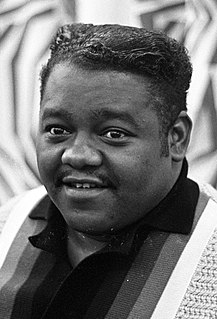
Talking Heads were an American rock band formed in 1975 in New York City and active until 1991. The band was composed of Scottish-born David Byrne, Chris Frantz (drums), Tina Weymouth (bass) and Jerry Harrison. Described as "one of the most critically acclaimed bands of the '80s", the group helped to pioneer new wave music by integrating elements of punk, art rock, funk, and world music with an anxious, clean-cut image.

Antoine Dominique Domino Jr., known as Fats Domino, was an American pianist, singer and songwriter. One of the pioneers of rock and roll music, Domino sold more than 65 million records. Born in New Orleans to a French Creole family, Domino signed to Imperial Records in 1949. His first single "The Fat Man" is cited by some historians as the first rock and roll single and the first to sell more than 1 million copies. Domino continued to work with the song's co-writer Dave Bartholomew, contributing his distinctive rolling piano style to Lloyd Price's "Lawdy Miss Clawdy" (1952) and scoring a string of mainstream hits beginning with "Ain't That a Shame" (1955). Between 1955 and 1960, he had eleven Top 10 US pop hits. By 1955, five of his records had sold more than a million copies, being certified gold.

Easy listening is a popular music genre and radio format that was most popular during the 1950s to 1970s. It is related to middle-of-the-road (MOR) music and encompasses instrumental recordings of standards, hit songs, non-rock vocals and instrumental covers of selected popular rock songs. It mostly concentrates on music that pre-dates the rock and roll era, characteristically on music from the 1940s and 1950s. It was differentiated from the mostly instrumental beautiful music format by its variety of styles, including a percentage of vocals, arrangements and tempos to fit various parts of the broadcast day.
Doom metal is an extreme subgenre of heavy metal music that typically uses slower tempos, low-tuned guitars and a much "thicker" or "heavier" sound than other heavy metal genres. Both the music and the lyrics intend to evoke a sense of despair, dread, and impending doom. The genre is strongly influenced by the early work of Black Sabbath, who formed a prototype for doom metal. During the first half of the 1980s, a number of bands such as Witchfinder General and Pagan Altar from England, American bands Pentagram, Saint Vitus, the Obsessed, Trouble, and Cirith Ungol, and Swedish band Candlemass defined doom metal as a distinct genre.

Music journalism is media criticism and reporting about music topics, including popular music, classical music, and traditional music. Journalists began writing about music in the eighteenth century, providing commentary on what is now regarded as classical music. In the 1960s, music journalism began more prominently covering popular music like rock and pop after the breakthrough of The Beatles. With the rise of the internet in the 2000s, music criticism developed an increasingly large online presence with music bloggers, aspiring music critics, and established critics supplementing print media online. Music journalism today includes reviews of songs, albums and live concerts, profiles of recording artists, and reporting of artist news and music events.

Greil Marcus is an American author, music journalist and cultural critic. He is notable for producing scholarly and literary essays that place rock music in a broader framework of culture and politics.

Sister Rosetta Tharpe was an American singer and guitarist. She gained popularity in the 1930s and 1940s with her gospel recordings, characterized by a unique mixture of spiritual lyrics and electric guitar. She was the first great recording star of gospel music, and was among the first gospel musicians to appeal to rhythm and blues and rock and roll audiences, later being referred to as "the original soul sister" and "the Godmother of rock and roll". She influenced early rock-and-roll musicians including Little Richard, Johnny Cash, Carl Perkins, Chuck Berry, Elvis Presley, Jerry Lee Lewis, and Eric Clapton.

The Blasters are an American rock band formed in 1979 in Downey, California, by brothers Phil Alvin and Dave Alvin (guitar), with bass guitarist John Bazz and drummer Bill Bateman. Their self-described "American Music" is a blend of rockabilly, early rock and roll, punk rock, mountain music, and rhythm and blues and country.
Michael Billig is a British academic. He is Emeritus Professor of Social Sciences at Loughborough University, working principally in contemporary social psychology although much of his work crosses disciplinary boundaries in the social sciences.

Gary Joseph Lachman, also known as Gary Valentine, is an American writer and musician. He came to prominence in the mid-1970s as the bass guitarist for rock band Blondie. Since the 1990s, Lachman has written full-time, often about mysticism and occultism.
Season of the Witch may refer to:

Robert Hilburn is an American pop music critic, author, and radio host. As critic and music editor at the Los Angeles Times from 1970 to 2005, his reviews, essays and profiles appeared in publications around the world. Hilburn has since written a memoir and best-selling biographies of Johnny Cash and Paul Simon. He was a member of the nominating committee of the Rock and Roll Hall of Fame for more than 20 years and lives in Los Angeles.

Kenneth Tucker is an American arts, music and television critic, magazine editor, and non-fiction book writer.
Tim Riley reviews pop and classical music for NPR, and has written for The New York Times, truthdig, the Huffington Post, the Washington Post, Slate.com and Salon.com. He was trained as a classical pianist at Oberlin College and Eastman School of Music.
Steven Hyden is an American music critic, author, and podcast host. He is the author of the books Your Favorite Band Is Killing Me, Twilight of the Gods, Hard to Handle, and This Isn't Happening. He co-hosts the podcasts Indiecast and 36 From the Vault and previously hosted the podcasts Rivals, Break Stuff: The Story of Woodstock '99, and Celebration Rock. He is a critic for Uproxx and previously served as staff writer at Grantland and an editor at The A.V. Club.

Save Rock and Roll is the fifth studio album by American rock band Fall Out Boy. It was produced by Butch Walker and released April 12, 2013, through Island Records. On October 15, the album was re-released with PAX AM Days, an extended play the band recorded shortly after Save Rock and Roll's release.

Shankar Vedantam is an American journalist, writer, and science correspondent. His reporting focuses on human behavior and the social sciences. He is best known for his Hidden Brain family of products: book, podcast, and radio program.

Christgau's Record Guide: Rock Albums of the Seventies is a music reference book by American music journalist and essayist Robert Christgau. It was first published in October 1981 by Ticknor & Fields. The book compiles approximately 3,000 of Christgau's capsule album reviews, most of which were originally written for his "Consumer Guide" column in The Village Voice throughout the 1970s. The entries feature annotated details about each record's release and cover a variety of genres related to rock music.
Occult rock is a subgenre of rock music that originated in the late 1960s to early 1970s, pioneered by bands such as Coven and Black Widow.
Tom Hull is an American music critic, web designer, and former software developer. Hull began writing criticism for The Village Voice in the mid 1970s under the mentorship of its music editor Robert Christgau, but left the field to pursue a career in software design and engineering during the 1980s and 1990s, which earned him the majority of his life's income. In the 2000s, he returned to music reviewing and wrote a jazz column for The Village Voice in the manner of Christgau's "Consumer Guide", alongside contributions to Seattle Weekly, The New Rolling Stone Album Guide, NPR Music, and the webzine Static Multimedia.













